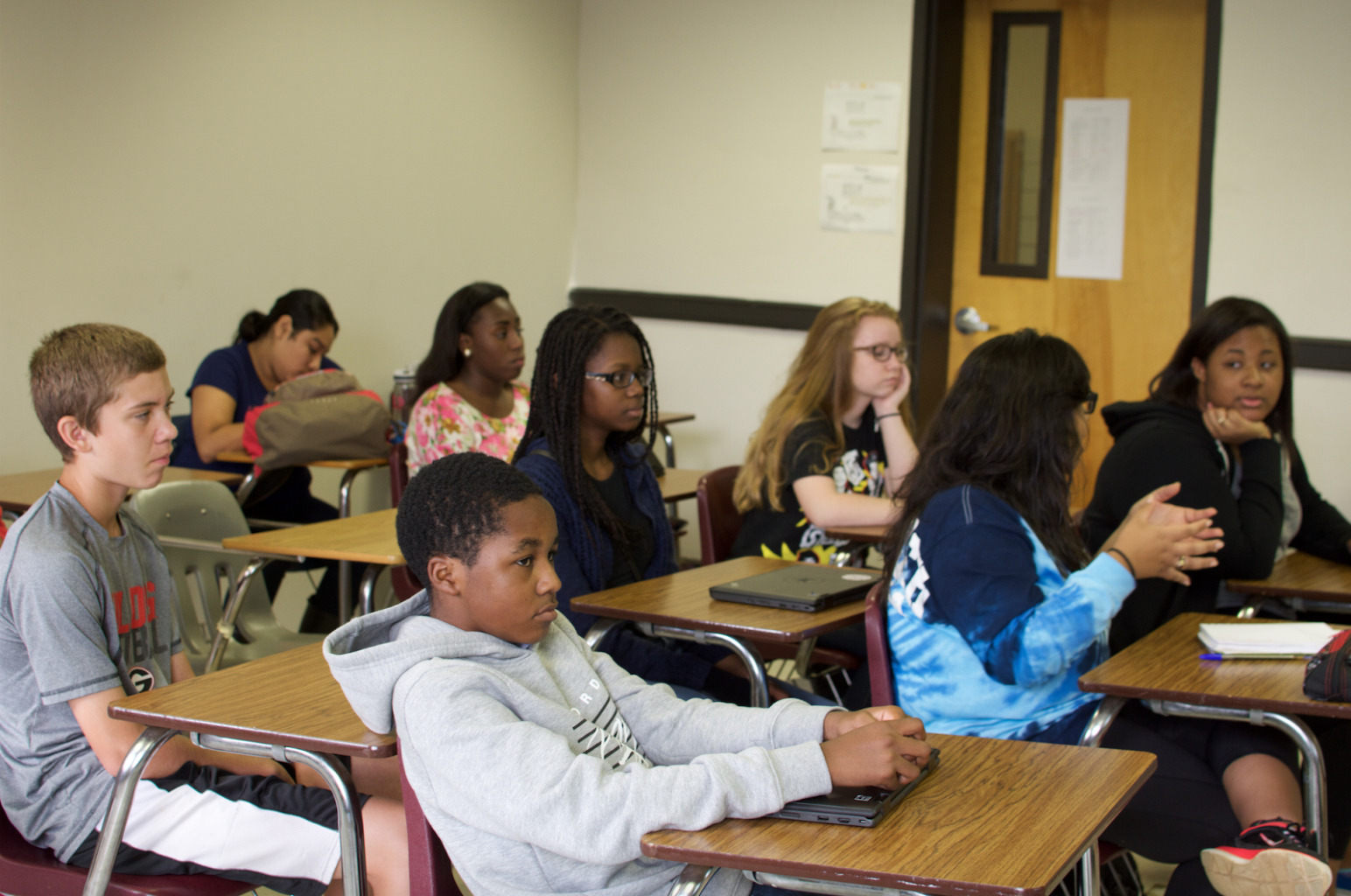On Sept. 9, students sit in English teacher Ame McNair’s new Glad Time option, Kiva Club — an organization that works to reduce poverty. Kiva chapters around the world support Kiva’s mission by loaning money to the organization. “We would like to focus on recruitment, publicity, fundraising, and studying the impact individuals have on making positive changes around the world,” McNair said.
By KARLA DOUGAN – Broadcast Editor
New English teacher Ame McNair offers a globally-minded Glad Time offering for students.
Karla Dougan: What is Kiva Club?
Ame McNair: Kiva.org is a global microfinancing organization that uses crowd sourcing to support individuals and groups requesting loans to address issues of poverty. Kiva’s mission is to connect people through lending to alleviate poverty.
People around the world request loans to provide an education for their children, to obtain clean water, to provide food for their family, to repair their house, and to buy inventory to sell at the market. A lender will typically loan $25 and be paid back in less than a year.
Since Kiva was founded in 2005, there have been 1,3339, 640 lenders so, as you can see, it is enormously popular. Kiva lenders have made over $750,000,000 in loans. Those who borrow have an almost 99 percent repayment rate. Kiva loans are given out in 83 countries around the world.
Kiva Clubs are high school and college clubs that support Kiva’s goals. Colleges from Harvard to the University of Georgia participate and many high schools do, as well. Millions of dollars have been loaned from, and paid back to, these clubs.
KD: When did you decide to start it?
AM: I’ve thought about starting a Kiva Club for years but have not been in a school community that provides so many opportunities for students. Glad Time is the perfect chance for us to start this club.
KD: How did you go about starting it?
AM: Kiva.org is very supportive of anyone who wants to participate. A former Google executive started Kiva.org and therefore there is a massive amount of online support for Kiva Clubs. There is very little I’ve had to do as Kiva.org has done it for me.
KD: How did you learn about it?
AM: I was looking for a way to make a positive contribution on a teacher’s salary. I originally invested $25 and over time that same $25 made 30 loans totaling almost $800. It doesn’t take much to make a difference in someone else’s life.
KD: What are your hopes for Kiva Club this semester/year?
AM: Our initial hope is that we will be able to recruit enough students to be able to continue our Kiva Club in the future. We also hope that students learn about other cultures, and that a small act of giving can create a better world for all of us.
KD: How many students are a part of the club this semester?
AM: We are small, but mighty. We highly encourage all students to consider joining us. Many students may be unaware that college admissions offices look beyond a student’s GPA and take notice of those students who go above and beyond. Participating in clubs that promote global citizenship and social justice is one way to not only contribute, but to be noticed.
KD: How do you think Kiva Club will benefit students at CCHS?
AM: Anytime a student contributes positively to the welfare of others, they, and the world, benefit. As a school community we can focus on the idea that it is better to give than to receive. There are so many benefits to helping others before self. Additionally, there are roles in the club like fundraiser, publicist, and financial officer, which allow students to grow into positions that they may well hold in the future. Students will participate really will be student leaders in our school.
KD: What do you do in Kiva Club?
AM: We have only met once so are discussing our goals going forward. We would like to focus on recruitment, publicity, fundraising, and studying the impact individuals have on making positive changes around the world. We hope to bring in speakers as well as connect with citizens around the world. Most importantly, we hope to be will be making loans to those most in need.
KD: Why is it important to you?
AM: I think often we get involved in our own small worlds and forget about the greater communities at large. Recognizing that issues of poverty impact us locally is important but equally important is participation as a global citizen.
